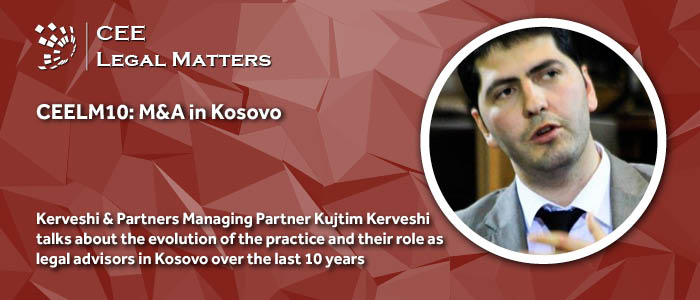Kerveshi & Partners Managing Partner Kujtim Kerveshi talks about the evolution of the practice and their role as legal advisors in Kosovo over the last 10 years
CEELM: Over the last 10 years, what types of projects have been keeping your M&A team busy?
Kerveshi: Our M&A team has been involved in a diverse range of projects. Initially, we found ourselves engaged in construction, IT technology, private hospitals, and the energy sector, including mines and minerals. However, in the last five years, technology has emerged as a dominant player. The market, both locally and internationally, witnessed a surge in technology-related projects. This growth trend continued even through the challenges posed by the COVID-19 pandemic.
CEELM: What were the specific dynamics within these sectors, and how have they evolved over the years?
Kerveshi: In the technology sector, we observed a significant increase in both local and international markets. Local entities began expanding and selling shares to international investors. This trend intensified post-2018. Energy experienced substantial growth due to government initiatives supporting alternative energy parks. While some international investors explored opportunities, regulatory obstacles and opposition from public entities presented challenges. In the life sciences sector, particularly in terms of private hospitals, German and Turkish investors played a prominent role. However, the intricacies of license transfers and regulatory compliance added layers of complexity to our work. Construction, a sector we enjoyed a lot of mandates in, faces uncertainties and legal security issues. Despite a brief pause during the pandemic, the industry continued to grow rapidly, albeit with more competitive pricing.
CEELM: During this time, what were the most intense periods for your team?
Kerveshi: The past decade brought both challenges and opportunities. The COVID-19 pandemic, while having negative impacts, also accelerated developments in technology. Remote working and virtual communication became essential tools, facilitating discussions with clients. Sectors like retail, medicine, and pharmaceuticals experienced growth, offsetting the decline in areas such as electricity, mines, and minerals, where government policies to shut down businesses impeded progress. Post-COVID, a surge in investments occurred, but the momentum has slowed down recently, possibly due to political or security concerns.
CEELM: How have your client profiles evolved during this period?
Kerveshi: Our client base has grown significantly over the years, encompassing a diverse array of entities. We have established strong partnerships with major banks and retail companies, witnessing mutual growth. Referrals from existing clients and collaborations with other law firms have contributed to our expansion. As to the origin of investors, we have seen German, Swiss, Turkish, Israeli, Dutch, and UK- and US-based companies investing in our country. Among notable regional investors are Albania, Croatia, and North Macedonia.
CEELM: How have client needs and expectations evolved over the years?
Kerveshi: Clients are drawn to Kosovo for its appealing investment environment, driven by factors like zero tax on dividends and a youthful, English-speaking population. However, complex and time-consuming bureaucratic processes in certain sectors have become a point of contention. Investors increasingly value streamlined interactions with public institutions, emphasizing the importance of efficiency in obtaining permits and licenses. These days, we particularly notice that investors’ main wish remains a lowering of bureaucratic hurdles.
CEELM: What recurring challenges have you faced in facilitating deals?
Kerveshi: Kosovo maintains a rather stable regulatory landscape, with minimal legislative changes. The establishment of a new commercial court was a recent development impacting the legal landscape. However, ongoing discussions and transitions have sometimes led to delays in legal disputes, emphasizing the importance of timely justice. Additionally, the majority of businesses, particularly those engaged in public contracts, are currently experiencing a downturn. This is due to the government, since taking office, discontinuing significant calls for public contracts. As a result, businesses in this sector are falling apart due to a substantial impact on the flow of money within these enterprises.
CEELM: Looking ahead, what do you believe is on the horizon for M&A in Kosovo, and what might be the highlights in a similar interview 10 years from now?
Kerveshi: The trajectory of Kosovo’s integration into the EU holds significant implications for attracting investors. As we move closer to EU integration, changes in legislation and increased international investor interest are anticipated. Not being a member of the Council of Europe poses limitations, and the current constitutional framework remains a local institution. Changes on this front are inevitable. However, challenges related to security and geopolitical dynamics with Serbia may influence the pace of these developments. Nevertheless, the impact of international investors and the adoption of EU directives are likely to be transformative, shaping the landscape for M&A in Kosovo over the next decade.
Kerveshi & Partners is CEE Legal Matters' Practice Leader for Corporate/M&A in Kosovo for 2024 – learn more here.
This article was originally published in Issue 10.11 of the CEE Legal Matters Magazine. If you would like to receive a hard copy of the magazine, you can subscribe here.

















